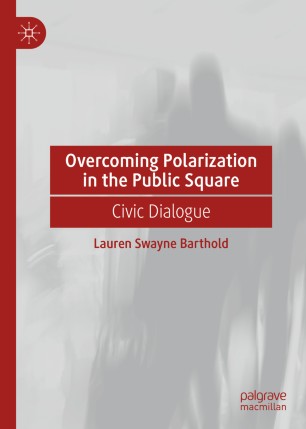 Submitted by: Lauren Barthold This book describes how civic dialogue can serve as an antidote to a polarized public square. It argues that when pervasive polarization renders rational and fact-based argumentation ineffective, we first need to engage in a way that builds trust. Civic dialogue is a form of structured discourse that utilizes first-person narratives in order to promote trust, openness and mutual understanding. By creating a dialogic structure that encourages listening and reflection, particularities and differences about fraught identities can be expressed in such a way that leads to the possibility of connecting through our fundamental, shared and deeply felt humanity. Drawing on Plato, Buber, Gadamer, Dewey, cognitive bias research, as well as the work of dialogue practitioners, Lauren Swayne Barthold provides a sustained defense of civic dialogue as an effective strategy for avoiding futile political arguments and for creating pluralistic democratic communities. https://link.springer.com/book/10.1007/978-3-030-45586-6
0 Comments
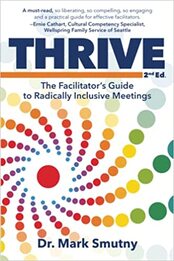 Submitted by: Mark Smutny Imagine meetings where everyone is heard and all people matter. Picture organizations that embrace all voices and are committed to justice, equity and opportunity. Imagine businesses, nonprofits and the public sector creatively engaging people in thousands of ways—seeking their best ideas, empowering the silenced, and building communities where all are treated with dignity and respect. That’s what Thrive seeks to create. Each chapter contains practical insights and accessible stories that transform meetings from dull to dynamic. You will learn how to: • capitalize on diversity’s strengths. • keep meetings task-oriented and collegial. • facilitate effectively in polarized or conflicted settings. Thrive includes chapters on privilege and power, multilingual and virtual meetings, and full inclusion of people with disabilities. Whether you are a skilled practitioner or new to leadership, Thrive will teach you techniques for facilitating more effective, inclusive and energizing meetings. About the Author - Dr. Mark Smutny is a professional facilitator, DEI consultant, speaker, author and founder of Civic Reinventions, Inc. He is known for helping organizations uncover the wisdom hidden in their diversity, build cohesion, and achieve their goals. He draws upon decades of work planning and leading retreats, facilitating meetings, and working with nonprofits and businesses. https://www.amazon.com/Thrive-Facilitators-Radically-Inclusive-Meetings/dp/1945847484?tag=tarrale-20&geniuslink=true  A Conversation Café is a 90-minute hosted conversation which is held in a public setting like a coffee shop, bookstore or library, where anyone is welcome to join. Its simple format helps people feel at ease and gives everyone who wants to a chance to speak. The CC method was created by Vicki Robin, Susan Partnow and Habib Rose. During the summer of 2001, Habib, a natural networker, invited Vicki Robin and Susan Partnow to experiment with organizing neighborhood gatherings of “Cultural Creatives” in Seattle. The Cultural Creatives: How 50 Million People Are Changing the World is a nonfiction social sciences and sociology book by sociologist Paul H. Ray and psychologist Sherry Ruth Anderson. The three Seattleites were set to launch Conversation Cafés in September 2001, but changed gears after the 9-11 terror attacks took place. They immediately began hosting CCs to help people process their emotions and thoughts on what had and was happening in the country. Posted by NCDD Community | March 27th, 2019
The following meeting facilitation tips were submitted by John Godec of The Participation Company. As public sector consultants, The Participation Company helps government agencies manage public issues to accomplish agency objectives. Their private sector business clients are able to maintain or improve their relationships with the public and gain support for their projects. Facilitating meetings can be both an art and a science when the issues being discussed are comparably complex. Getting the right people involved in the discussion from the start can go a long way in your being able to facilitate successfully. Inviting those “right” people is key to reaching consensus. But how to craft an effective invitation is not always a skill everyone has. Here are some meeting facilitation tips to help when creating meeting invitations: Posted by D&D Resources | December 24th, 2009
Dialogue and deliberation are dynamic processes which can be empathy-enhancing, relationship-changing, problem-solving, action-planning, organization-developing, community-building, conflict-resolving, skill developing, prejudice reducing, consciousness-raising, and more! The various models and methods that are used in our field often emphasize, strive for and obtain different outcomes. This resource shares some great quotes from over a dozen leaders in the D&D community about what “dialogue” means to them. Also see our list of leaders’ definitions of deliberation. How do people in the field describe dialogue?‘Dialogue is shared exploration towards greater understanding, connection, or possibility.’
Living Room Conversations published the conversation guide, Guns and Responsibility, in October 2017. The guide gives pointers on how to hold living room conversations in order to develop a deeper understanding between participants around gun beliefs, gun safety, and responsible gun ownership. You can read the guide below, find a downloadable PDF here, or the original on Living Room Conversation’s site here.
From the guide… Overview In Living Room Conversations, a small group of people (e.g. 4-7) people come together to get to know one another in a more meaningful way. Guided by a simple and sociable format, participants practice being open and curious about all perspectives, with a focus on learning from one another, rather than trying to debate the topic at hand. 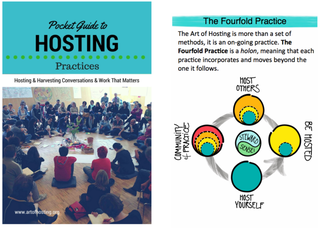 Story Artist Mary Alice Arthur and graphic facilitator Viola Clark collaborated in 2016 to create the first in their Zine series – a POCKET GUIDE TO HOSTING. One side features the Art of Hosting practices, the other side features the AoH methods. Here is a little snapshot of a couple of pages of the zine. (A zine is a self-published work of original or appropriated texts and images, usually reproduced via photocopier.) Art of Hosting will be using the Zine in the upcoming trainings in Innsbruck, Austria and Denmark. Next in the series will be Harvesting. Mary Alice advises: “It is set up as an A4 (if you are not on the A4 system, shrink to fit the space) — follow the instructions for folding (and unleash your inner creative geek!).” Resource Link: AoH Hosting Zine The 42-page article, Affinity Groups, Enclave Deliberation, and Equity (2016), was written by Carolyne Abdullah, Christopher Karpowitz, and Chad Raphael, and published in the Journal of Deliberative Democracy: Vol. 12: Iss. 2. The article provides evidence for the practice of holding enclaves for marginalized groups within dialogue and deliberation processes, as part of a larger conversation. They have found that by creating space within affinity groups for enclaves to dialogue; processes are more inclusive, participatory, and democratic. The authors show several ways in which enclave groups can be used in democratic processes and implemented within government practice.
Read an excerpt of the article below and find the PDF available for download on the Journal of Public Deliberation site here. From the article… The article, More Than a Seat at the Table: A Resource for Authentic and Equitable Youth Engagement (2016), was written by Rebecca Reyes and Malana Rogers-Bursen, and published by Everyday Democracy. This article explores several challenges when it comes to youth engagement and offers solutions to more effectively engage young people. It is important to engage young people in meaningful ways and for them to be a part of the key decision-making processes. Use this article as a way to gauge if your processes are inclusive of young people and how to improve those processes to better engage youth.
Below is an excerpt of the article from Everyday Democracy, and can find the full article with all the examples of the specific challenges and solutions here. From Everyday Democracy… If you’re working on creating change in your community, it’s important to include all kinds of people in decision-making, including young people. The insight and talents of young people can bring value to any community change effort, yet community groups led by older adults sometimes find it hard to involve younger people, or keep them engaged. We’ve led workshops on youth engagement to help people explore challenges they may face and think about possible solutions. People of all ages and from many sectors contributed their ideas for successfully engaging young people in their efforts. We’ve compiled a number of challenges that you may have encountered in your work or that may come up in the future, along with ways to address these challenges in your group. 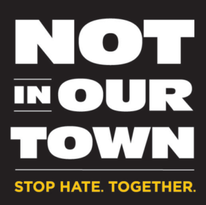 The Not in Our Town Quick Start Guide: Working together for safe, inclusive communities, was created by Not in Our Town (NIOT) and updated March 2013. The guide gives five steps to begin a campaign in your town or school to stop hate, address bullying, and build safer communities together. Below is an excerpt from the guide, which can be downloaded from NIOT’s site here or at the link at the bottom of the page. From the guide… You may be someone who is concerned about divisions in your neighborhood or school, or you may live in a community that has experienced hate-based threats or violence. Even just one individual or a small group can start a movement to stand up to hate. Not In Our Town is a program for people and communities working together to stop hate, address school bullying and build safe, inclusive environments for all. 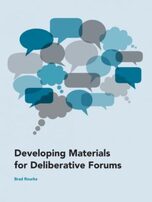 The 36-page guide, Developing Materials for Deliberative Forums, was written by Brad Rourke and published 2014 on the Kettering Foundation site. In the guide, Rourke shares all the elements needed to design an issue guide to better inform participants during deliberation. An issue guide lays out multiple sides of a subject/issue to give participants tools to engage in more informed deliberation, the guide then offers examples of the options, as well as, drawbacks to each one. There is no one perfect way to develop an issue guide; so Rourke provides details on ways to design a guide that is effective at giving participants the information they need to deliberate on the issues at-hand. Below is an excerpt of the article; it can be downloaded in full at the link on the bottom of this page or find it on Kettering Foundation’s site here. From the guide… The 24-page guide, Organizing Study Circles with Young People, was developed by Everyday Democracy [who used to be known as Study Circles Resource Center] and published in 2003. Oftentimes younger people are excluded from participating in engagement efforts, even though youth have much to offer on making decisions and building community. Study Circles are a style of dialogue process, where a small, diverse group of participants can discuss different points of view; usually with the goal of moving from dialogue to action. The guide gives detailed steps for designing a Study Circles process for young people to come together and dialogue. This process encourages youth to be engaged with a variety of perspectives, to hear and be heard, and ultimately to become more active citizens.
Below is an excerpt from the guide and it can be found in full to download on Everyday Democracy’s site here or at the bottom of this page. 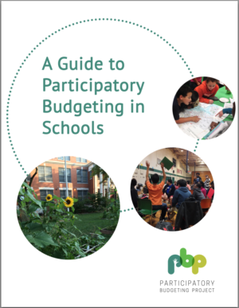 The 57-page guide, A Guide to Participatory Budgeting in Schools, was a project of the Participatory Budgeting Project (PBP) and published in 2016. The guide’s curriculum design was created by Valeria Mogilevich, with project support by Melissa Appleton and Maria Hadden of PBP. This thorough guide gives details for implementing a participatory budgeting process within schools. Participatory budgeting is a process where people decide where to spend a portion of a budget by engaging their community- or in this case- their school, and vote on projects to make final decisions. The guide is rich with process details, helpful hints, plan layouts, and useable worksheets. There are 18 lesson plans and 6 worksheets provided in this guide to get a PB process launched in schools over the course of a semester or school year. Sections include: – Planning – Idea Collection – Proposal Development – Voting – Implementation and Beyond – Worksheets |
Categories
All
|
Follow Us
ABOUT NCDD
NCDD is a community and coalition of individuals and organizations who bring people together to discuss, decide and collaborate on today's toughest issues.
© The National Coalition For Dialogue And Deliberation, Inc. All rights reserved.
© The National Coalition For Dialogue And Deliberation, Inc. All rights reserved.


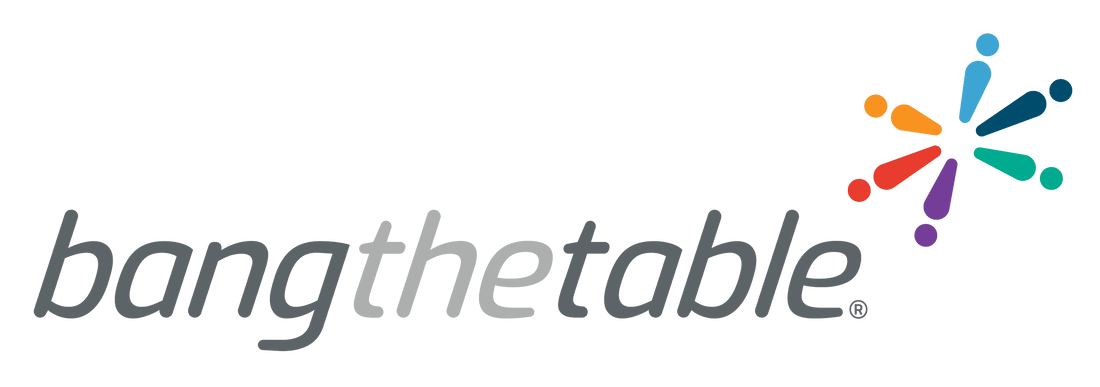
 RSS Feed
RSS Feed